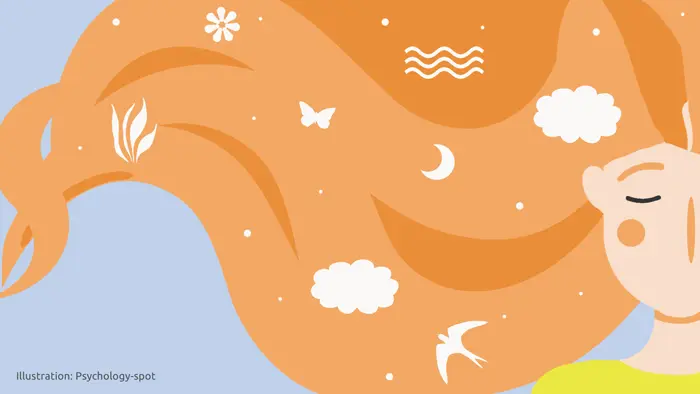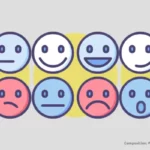
Hugs are a particularly intimate and intense way of expressing emotions. Through a hug we can transmit our happiness or sadness. We can tell a person that they can count on us unconditionally or that we understand their state of mind. And all without having to resort to words.
However, hugging not only helps us connect with others and express what we feel. Giving hugs is good for health, for our brain and, of course, for our emotional balance.
How hugs influence our brain?
When someone hugs us, that contact activates the pressure receptors we have on the skin, which are known as Pacini corpuscles and respond mainly to deep pressure. These receptors immediately send a series of calm signals to the vagus nerve to, among other things, deactivate the area of the brain that responds to threats and keeps us tense.
At that moment we begin to feel good because that nerve connects with nerve fibers that reach different cranial nerves and play an important role in regulating most of the key functions of our body, including blood pressure.
As a result of hugging and stimulating the vagus nerve, the heart rate and blood pressure decrease. The respiratory rate also slows down, which helps us breathe more deeply and fully.
In fact, the vagus nerve plays an important role in the parasympathetic system, which would be a kind of nervous system handbrake that is activated when we are under too much stress or are overexcited. Therefore, stimulating the vagus nerve through hugging allows us to recover from tension, relieves agitation and helps us develop a state of calm and well-being.
Through this mechanism, hugs come to “hack” our brain. In fact, they stimulate the production of dopamine, a neurotransmitter known as “the pleasure hormone” since it generates a pleasant feeling of satisfaction that helps to relieve stress and tension.
It has also been appreciated that hugging increases the production of oxytocin, known as “the love hormone”, which allows us to connect emotionally with other people and encourages us to trust them.
Best of all, the benefits of hugging are immediate. A study carried out at the Advanced Telecommunications Research Institute International in Kyoto led a group of people to talk for 15 minutes with their partners, then some received a hug and others did not.
When evaluating their physiological parameters, the researchers appreciated that those who received a hug showed a significant reduction in the level of cortisol in the blood, the stress hormone that causes so much damage in our body.
Hugs help us feel good about ourselves
A friendly hug, or a gentle, affectionate caress, influence the brain’s ability to build body image, even in adults. This type of physical contact is also essential to develop and maintain a proper sense of our body.
According to a study carried out at University College London, the explanation is that this type of body contact provides very pleasant tactile sensations that generate a series of proprioceptive signals, which help us feel better in our body.
In practice, a caress or a hug not only sends proprioceptive signals to our brain that allow us to be more aware of our body, but also tells it that we are worthy of being loved. And those feelings make us feel very good.
In fact, these researchers warn that a lack of hugging and caressing could be a trigger – or an aggravation – for body image disorders like anorexia and bulimia.
Also, a hug in bed is also beneficial to fight insomnia. It helps you relax and sleep deeply.
How many hugs do we need to be happy?
We could all live without hugs, but it would be like dying slowly, a little every day. For this reason, the family psychotherapist Virginia Satir affirmed that “We need 4 hugs a day to survive, 8 hugs to maintain ourselves and 12 hugs to grow.” According to her, we need 8 hugs a day to be happy, which would be a kind of hug therapy.
In fact, in an UCLA investigation, researchers scanned participants’ brains while receiving electric shocks. Their partners accompanied them during the test and, in some cases, allowed them to hold their hand.
Thus they appreciated that the brain areas responsible for attenuating fear were activated, which helped them cope with the stress of the experience. The physical contact makes us feel more secure, which decreases our reactivity to potentially threatening experiences and makes us less sensitive to physical pain.
Another research conducted at Carnegie Mellon University revealed that hugging can dramatically improve our mood and make us see things from a more positive perspective, even in the worst circumstances.
These researchers called 404 people every night for two weeks to ask about their interpersonal conflicts in their lives, inquire into their mood and find out how many hugs they received during the day.
93% of people indicated that they received at least one hug during the days of the experiment and 69% had experienced at least one conflict with another person in that time frame.
Psychologists found that people felt better than usual on days when they had received at least one hug, and worse on days when they had a conflict with other people. However, if they received a hug the same day they argued with someone, their mood was better.
In fact, hugs even had a protective effect. When people received a hug, they had less conflict the next day and the bad mood for everyday problems was minor.
All these findings show that hugging has a powerful effect on our brain and helps us achieve a state of relaxation and well-being, while allowing us to better cope with stressful situations. Its buffering effect on stressful events also reveals that hugs are needed to be happy.
So even if you don’t get exactly 8 hugs a day, make sure you get your daily dose. Display a sign saying “cuddle therapy needed”. It is good for you and the person you hug. In fact, the next time you see a friend or family member distressed, just hug them. Sometimes words are useless. There is nothing like that intimate contact to strengthen ties and show you support.
Sources:
Murphy, M. L. et. Al. (2018) Receiving a hug is associated with the attenuation of negative mood that occurs on days with interpersonal conflict. PLoS One; 13: e0203522.
Sumioka, H. et. Al. (2013) Huggable communication medium decreases cortisol levels. Nature; 3: 3024.
Crucianelli, L. et. Al. (2013) Bodily Pleasure Matters: Velocity of Touch Modulates Body Ownership During the Rubber Hand Illusion. Frontiers in Psychology; 4: 703.
Inagaki, T. K. & Eisenberger, N. I. (2012) Neural correlates of giving support to a loved one. Psychosom Med; 74(1): 3-7.
Holt-Lunstad, J. et. Al. (2008) Influence of a “warm touch” support enhancement intervention among married couples on ambulatory blood pressure, oxytocin, alpha amylase, and cortisol. Psychosom. Med; 70: 976–985.




Kaye Glennon says
I’m wondering, during this time of social-distancing, what this is doing to people? Is there a substitute? Can you self-hug? Does a stuffed animal work? I imagine pets help, but not everyone has one of those. Any thoughts?